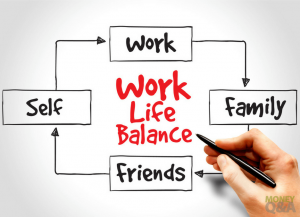
Achieving a work life balance is often discussed, but infrequently agreed-upon by workers and their employers alike. While some people argue that it’s up to companies and managers to allow their employees greater flexibility in their careers to balance out their familial obligations and personal enrichment activities, others such as TED Talk speaker Nigel Marsh argue that it’s up to individuals to balance out their day jobs and personal lives on their own terms.
According to the American Psychological Association’s annual “Stress in America” survey, stress and anxiety among American workers reached all-time highs this year. Work-related stress can lead to mental exhaustion, physical illness, and other detrimental consequences, so there has arguably never been a greater need for work life balance in our society.
Rather than getting stuck in a 50-60 hours per week rut in the office, developing a work life balance can be incredibly beneficial for your physical and mental health, even if it means getting paid slightly less for working fewer hours each week. You might not even have to experience a decrease in pay if you maintain a high level of productivity by working smart instead of continuing to work hard without looking for areas to improve, such as time management, on-task attentiveness, and separating the essential communication from the frivolous communication.
How to Develop a Genuine Work Life Balance
If you currently struggle with making time for family, friends, and your non-work related hobbies, then here are a few ways you can clarify your priorities and strive for greater work/life balance:
Get Serious About Organization
Organization is one of those to-do list items that we never seem to get around to finishing. We assure ourselves that we’ll revamp our folder organization system, clean up our scheduling planners, and clear out or desks of non-necessary paperwork, but with so much going on throughout the workday, it can be all too easy to push organizational goals to the side until we feel “caught up.”
The problem is, we’ll never completely catch up on everything, so it’s crucial to acknowledge the importance of organization to help us manage our time more efficiently and find new ways to free up time for our families and personal hobbies.
You can start by downloading useful organization apps and setting a clear schedule that you will actually stick to. Find as many ways to remove the clutter from your life as possible, which will free up more space and time for things you truly enjoy beyond your job.
This seems like a simple step, but it will likely be the most difficult task because greater organization requires a change in your mentality in order to create permanent change in your approach to work and life. Be patient, let yourself make mistakes, and never waver from the goal.
Stop Trying to Multitask
Neurological scientific research has repeatedly shown that humans are terrible at multitasking. Even if we think we’re doing a great job of juggling seven different assignments at one time, we’re likely experiencing some diminishing returns on productivity compared to tackling one task at a time and moving onto the next assignment only after the previous one is completed.
Instead of trying to confront several tasks at the same time, you’d be much more efficient with your limited work time if you ditch your tendency to multitask. By taking an incremental, piece-by-piece approach, you’ll free up more time that you can allocate for your personal hobbies or socializing activities.
Schedule Exclusive “Off” Times

In our increasingly digitalized workplace, it’s easy for us to feel chained to our phones and email inboxes, always expecting a new issue to arise outside of normal working hours that we’ll have to deal with. While the constant attachment to your phone or laptop may feel comforting, you perceive you’ll never be out of the loop if you immediately know what’s going on at all times. But, others around you probably don’t appreciate seeing your eyes glued to your screen when you’re supposed to be spending time with them.
To avoid letting your work follow you everywhere you go, set aside blocks of time outside of your usual working hours for turning off your electronic devices. It can be difficult to initially break your addiction to technology, but your personal life and relationships will likely improve once you make a genuine effort to disengage from your phone and email for certain times during the day or night.
Dedicate Time for Yourself Every Day
This notion is deceptively simple: dedicate time to yourself. Sounds easy, right? In reality, we oftentimes get caught up in others’ expectations for us, whether it’s an over-demanding boss who wants more hours out of you, colleagues pressuring you into socializing after work instead of going home, a long list of familial obligations, and so on.
It can get pretty exhausting trying to please everyone, so the best way to recharge and balance your life out is by specifically scheduling time for yourself (whether it’s nap time, hobby time, reading time, etc.) each day.
Get in the Zone
One of the biggest productivity killers plaguing workers today is the presence of distractions. Whether you’re someone who checks emails as soon as new notifications appear on your screen or you feel compelled to multitask in a frantic effort to complete all your assignments by a deadline, constantly interrupting your brain’s attempt to focus on a single task can paradoxically create more work for you.
To minimize distractions and maximize your productivity, it’s crucial to let yourself “get in the zone” and hammer out tasks without social media, email, and human distractions getting in the way. To accomplish this, you should: log out of social media accounts during the time you specifically set aside for work, lock your office door (or put a “Do Not Disturb” sign on the knob if you must), silent your phone, and check email as infrequently as possible.
Some business leaders inform their clients and colleagues that they only check email for one hour each morning, which lets them be out of contact for the rest of the day without frustrating folks who expect immediate replies.
Schedule Social Time
This may seem silly, but for a workaholic who frequently chooses work over social gatherings (or worse: brings work to social gatherings and ignores everyone else), scheduling time specifically for socializing can give you the balance you need between your personal and professional lives.
Scheduling social time in your calendar and actually sticking to it will help you learn to close the laptop and go enjoy life with your favorite people without feeling an underlying sense of dread that you should be doing something work-related instead.
Find Lucrative Hobbies
When it comes to work life balance, it can be challenging for folks to decide between living to work or working to live (and many folks don’t have a choice in this matter). An alternative to this could be finding side income opportunities that allow you to spend more time doing what you enjoy, whether that leads to selling products and services on Fiverr, marketing your handmade crafts on etsy, caring for other people’s pets, babysitting, house sitting, tutoring, or any other hobby you can possibly turn into a money-making venture.
Some people even develop their own businesses instead of returning to work, which is an increasingly popular option for stay-at-home parents who want to save money on childcare and spend more time with their kids. While working is an inevitable part of most people’s lives between the ages of 18-45, you shouldn’t feel trapped in a job with long hours, boring tasks, and average pay if you want a greater work life balance.
Make Your Money Work for You
Even if you live paycheck-to-paycheck, you can still find room in your budget to invest. While you might not see immediate, big results by investing just $50-100 per month, you could eventually develop a diversified portfolio that will grow in value and payout in dividends (literally).
Achieving a work life balance is closer to reality than you might think. While some of these strategies take time and dedicated effort to create lasting change in your life, you could be well on your way to more happiness, more time with the family, and more personal fulfillment if you’re motivated enough to do whatever it takes to balance your professional and personal lives.
Creating a passive income stream with investments certainly takes a lot of research, careful planning, time, patience, and targeted investing, but soon you could flip the equation and make your money work for you instead of you always working for money. A passive income stream is ideal for anyone who wants greater work life balance because you could cut back your hours at a job you don’t like or you could buy happiness by paying someone else to complete tasks that you don’t enjoy in your personal life, such as cooking, washing your car, or cleaning your home.
A perfect balance between your career and personal life probably does not exist. However, there are many steps you can take to reduce the tidal wave of work threatening to overwhelm your personal life including improved organizational habits, eliminating clutter, disconnecting from electronics occasionally, reducing multitasking on the job, and scheduling time for yourself.
Even if you love your job, the constant stress and pressure you experience in the workplace can put a damper on your hobbies and social time with family and friends. So, rather than giving up, strive for a better work life balance by following the aforementioned advice.

